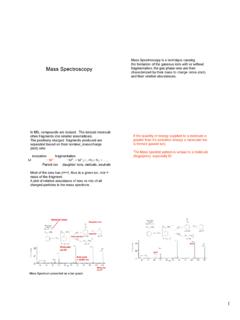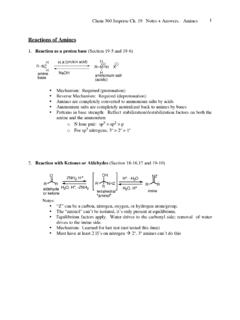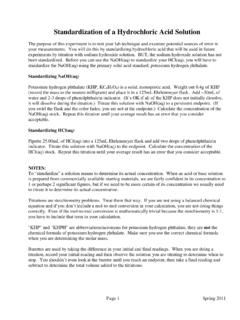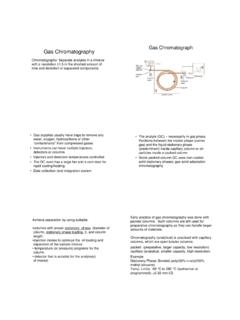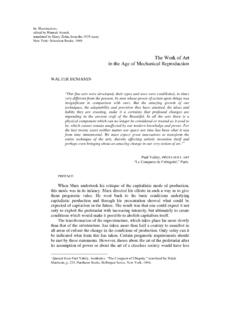Transcription of Emile Durkheim (1858-1917)
1 ANTH 348 Functionalism Every trait/feature/institution has some function/purpose in the overall system. Based on an organic analogy like that of Spencer. More concern with contemporary functions of traits/institutions than with their origin. 2 main types of functionalism in anthropology functionalism Associated singularly with the work of Bronislaw Malinowski. Focus shifts from group to individual how do social institutions function in the satisfaction of individual needs? Based on ideas first expressed by Emile Durkheim . Further articulated by Alfred Reginald Radcliffe-Brown. Individuals play little role "When the individual has been eliminated, society alone remains. We must, then, seek the explanation of social life in the nature of society it infinitely surpasses the individual in time as well as So, social behavior is more than a sum of all individuals.
2 Bronislaw Kaspar Malinowski (1884-1942) Like Boas, came from a science-based background. PhD, physics & mathematics,1908. PhD, anthropology 1922. Fieldwork in Australia & Trobriand Islands Interest in anthropology stimulated by reading James Frazer s The Golden Bough. First published 1890. Subtitled A Study in Magic and Religion . One of first attempts to look at religion dispassionately as a cultural phenomenon rather than from a theological perspective The other Malinowski Bronis aw Malinowski (4 June 1951 27 September 1981). Born in Nowe, was a Polish track and field athlete, named after the famous anthropologist. Best known for winning a gold medal in the 3000 m steeplechase race during the 1980 Summer Olympics held in Moscow, Soviet Union. A year later, Malinowski was killed in a car accident in Grudzi dz, at the age of 30.
3 Memorial to Malinowski in front of the Grudzi dz stadium Bronislaw Malinowski Two major contributions or biocultural brand of functionalism. standards for modern ethnographic research. Extended fieldwork Participant observation Bronislaw Malinowski Argonauts of the Western Pacific, 1922 Crime and Custom in Savage Society, 1926 Sex and Repression in Savage Society, 1927 The Sexual Life of Savages, 1929 Coral Gardens and Their Magic, 1935 A Scientific Theory of Culture, 1944 (Posthumously) The Dynamics of Culture Change: An Inquiry into Race Relations in Africa, 1945 (Phyllis Kaberry, ed.) Sex, Culture, and Myth, 1962 (Posthumously) A Diary in the Strict Sense of the Term, 1967 (Posthumously) Bronislaw Malinowski Focus of his theoretical approach came to be placed on individuals how do social institutions function in the satisfaction of individual needs?
4 For Malinowski, culture is utilitarian, adaptive, functionally integrated Bronislaw Malinowski Humans have certain basic needs nutrition, reproduction , bodily comfort, safety, relaxation, movement, growth. Basic needs are satisfied by derived cultural/social institutions. Culture is essentially a tool that responds to the needs of humans. In "The Group and the Individual in Functional Analysis" (1939) he claimed that an institution is a group of people united and organized for a purpose with a charter or explanation and technology with which to achieve that purpose. The Group and the Individual in Functional Analysis The science of culture should not be concerned with the raw material of anatomical and physiological endowment in the individual, but rather with the manner in which this endowment is modified by social influences.
5 The raw material of individual psychology is found everywhere refashioned by cultural and social determinism. But still, from the biological point of view, the group acts as an indispensable medium for the realization of individual bodily needs. Culture first and foremost as a vast instrumental all of which allow man to satisfy his biological requirements through co-operation and within an environment re-fashioned and re-adjusted. [But] the human organism .. itself becomes modified in the process and readjusted to the type of situation provided by culture. In this sense, culture is also a vast conditioning Culture thus produces individuals whose behavior cannot be understood by the study of anatomy and physiology alone, but has to be studied through the analysis of cultural At the same time, however, from the very outset the existence of groups is made indispensable by culture.
6 Parallel consideration of individual and organized groups is indispensable. Synoptic Survey of Biological and Derived Needs and Their Satisfaction in Culture Basic Needs (Individual) Direct Responses (Organized, , Collective) Instrumental Needs Responses to Instrumental Needs Symbolic and Integrative Needs Systems of Thought and Faith Nutrition (metabolism) Commissariat Renewal of cultural apparatus Economics Transmission of experience by means of precise, consistent principles Knowledge reproduction Marriage and family Bodily comforts Domicile and dress Characters of behavior and their sanctions Social control Safety Protection and defense Means of intellectual, emotional, and pragmatic control of destiny and chance Magic Religion Relaxation Systems of play and repose Renewal of personnel Education Movement Set activities and systems of communication Growth Training and Apprenticeship Organization of force and compulsion Political organization Communal rhythm of recreation, exercise and rest Art Sports Games Ceremonial Argonauts of the Western Pacific (1922)
7 Malinowski s study of the kula system of Trobriand Islands. Contained Malinowski s prescription for fieldwork. First cut oneself off from the company of other whitemen and remain in as close contact with the natives as possible. Long-term residence involving both observation and participation concern with the inponderabilia of actual life. Necessity of learning local language. Argonauts The Ethnographer has in the the duty before him of drawing up all the rules and regularities of tribal life; all that is permanent and fixed; of giving anatomy to their culture, of depicting the constitution of their society. But these things are nowhere formulated. There is no written or explicitly expressed code of laws, and their whole tribal tradition, the whole structure of their society, are embodied in the most elusive of all materials; the human Argonauts Kula transactions are examples of what we today call reciprocal exchange.
8 Elements of generalized & balanced reciprocity. Most of all Malinowski emphasized ceremonial aspect of the Kula. demonstrates that exchange is not just a material transaction in small-scale societies with nonmarket economies. Argonauts Shell ornaments (vaygu'a) exchanged with trade partners. White shell armbands (mwali) Red shell necklaces (soulava). Armbands & necklaces go in opposite directions. Must be traded for one another arm bands for necklaces & vice versa. No utilitarian function. in fact they were seldom worn. Prestige attached to specific kula items like family heirlooms or sports trophies. Prestige accrues with possession. but not for long since they must continue circulating. Argonauts Men used kula as a way to enhance, at least temporarily, their prestige & standing in their own community & in the eyes of others.
9 Usually lifelong trading partnerships with men on other islands. Some men had as many as 100 partners. Kula partners are like kinsmen who could be counted upon for support. Kula etiquette required that size & value of items had to be perfectly matched. But could be no haggling or discussion by any of traders. Argonauts There is also a more utilitarian trade accompanying the ceremonial trade Malinowski called it secondary trade or barter. Economic production and exchange of utilitarian goods is embedded within the social practices and cultural norms of the kula exchange, which was non-economic. Thus, Malinowski said to see the kula only in its economic aspects is to misunderstand it completely. His conclusion was that Kula is truly a multi-functional social institution central to Trobriand society.
10 Criticisms of Malinowski s approach Sidky accuses Malinowski of using logical fallacy of affirming the consequent if X then Y: Y therefore X He also claims that Malinowski substituted description for explanation To describe the effects of a cultural element is not the same as explaining it. The effects of a phenomenon cannot explain why the phenomenon developed in the first place. Famous Dead Germans The Science of Culture (Tylor) "Systems of Consanguinity and Affinity of the Human Family (Morgan) Marx & Engels Franz Boas Blues Malinowski song Hey Hey Durkheim Emile Durkheim (1858-1917) The Division of Labor in Society (1893) Rules of the Sociological Method (1896) Suicide (1897) The Elementary Forms of Religious Life (1912) Emile Durkheim Primary concerns were beliefs & symbols shared by members of society.

